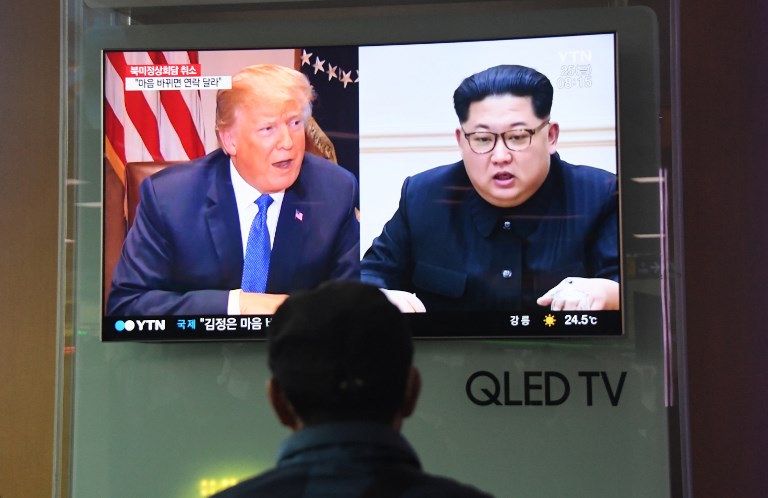Diplomatic duels: what now for the Trump-Kim summit?

A man watches a television news screen showing US President Donald Trump (L) and North Korean leader Kim Jong Un (R), at a railway station in Seoul on May 25, 2018. (AFP)
SEOUL–Events around the Korean peninsula have been moving at a dizzying pace over the last few days, with a summit between Donald Trump and Kim Jong Un that was on, then off, then apparently on again.
Here’s where we stand with what could be a historic meeting.
How did we get here?
A few months ago Kim and Trump were hurling insults and threats of war at each other.
The rhetoric began to cool during the Winter Olympics in South Korea, and by mid-March the two sides had agreed to a face-to-face.
Article continues after this advertisementAfter some back-and-forth, June 12 in Singapore was fixed on, but as May ticked over both sides began casting doubt on the meeting.
Article continues after this advertisementThe insults started up again, with North Korea calling US Vice President Mike Pence a “dummy”, and both sides threatening to walk away.
Trump abruptly pulled the plug last week, only to apparently reverse course 24 hours later in the wake of Pyongyang’s emollient response.
How did talks get back on track?
Some say Trump’s sudden willingness to walk rattled Pyongyang, which has since dialled down its rhetoric and expressed a willingness to talk “at any time”.
“Trump’s unexpected response totally took Kim by surprise and left the North scrambling to find a way to mend things,” Cho Sung-ryul, a senior researcher at the Institute for National Security Strategy, told AFP.
Others say the crisis was primarily averted by Kim and South Korea’s president Moon Jae-in, who made the extraordinary decision to meet in the Panmunjom truce village between the two Koreas.
The State Department says a team of US officials also met with North Koreans in Panmunjom on Sunday.
The Washington Post reported that senior diplomat Sung Kim was leading the US delegation and that the two sides planned to continue talking Monday and Tuesday.
The White House said on the weekend that a separate team of officials was also on its way to Singapore to lay the ground for the meeting.
Who is Sung Kim?
Few American officials have more experience of dealing with North Koreans than Sung Kim.
The Korean-born diplomat previously served as Washington’s ambassador in Seoul and was a special envoy during ultimately fruitless Six-Party Talks in the mid-2000s.
He is currently Washington’s envoy to the Philippines but has been called back to his old stomping ground — Trump has yet to nominate an ambassador to Seoul.
So is it going to happen?
Given the twists and turns, and the mercurial nature of the parties involved, few Korea watchers are prepared to say with any certainty. But most observers are confident the process is back on track — for now.
In the last 48 hours Trump has sounded upbeat, saying the June 12 meeting will still go ahead, or that it could happen at a later date if more time is needed. Usually these kind of summits are planned months, sometimes years in advance.
Now officials have only a fortnight left to finalise thorny protocol details such as where in Singapore the talks will take place and how internationally sanctioned North Korean officials will travel there.
Importantly, they’ll also have to decide what exactly the two men are going to talk about.
What are the stumbling blocks?
In a word, denuclearisation.
Both sides say they want it, but there is a yawning gulf between their definitions.
Washington says it wants to see the complete, verifiable and irreversible denuclearisation (CVID) of North Korea in return for sanctions and economic relief.
Trump wants to see CVID take place immediately — although he has recently conceded a phased approach could be discussed.
Moon says Kim is also committed to the “complete” denuclearisation of the Korean Peninsula. But when asked if that meant the same as CVID, he told reporters that was something for Pyongyang and Washington to discuss.
Analysts believe North Korea will be unwilling to cede its nuclear deterrent unless it is given security guarantees that the US won’t try to topple the regime.
That may mean they will look for confidence-building measures such as a reduction in US troops in South Korea or joint military drills.
Kim Sung-han, professor of international relations at Korea University, said Trump will have difficulty accepting any conditions from North Korea, partly because he had been so critical of the Iran nuclear deal.
“If he believes that it would be hard to include CVID or any specific terms to mandate the North to carry out nuclear disarmament quickly, he may cancel the summit again, even days before the event,” he said.